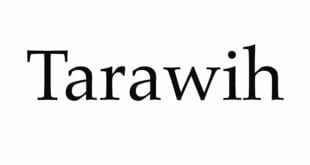سُبْحانَ ذِي الْمُلْكِ وَالْمَلَكُوتِ سُبْحانَ ذِي الْعِزَّةِ وَالْعَظمَةِ وَالْهَيْبَةِ وَالْقُدْرَةِ وَالْكِبْرِياءِ وَالْجَبَرُوْتِ سُبْحانَ الْمَلِكِ الْحَيِّ الَّذِيْ لا يَنامُ وَلا يَمُوتُ سُبُّوْحٌ قُدُّوْسٌ رَبُّنا وَرَبُّ المْلائِكَةِ وَالرُّوْحِ اللَّهُمَّ أَجِرْنا مِنَ النّارِ يا مُجيرُ يا مُجيرُ يا مُجيرُ
Question:Is it sunnah to read the above dua in between the 4 rakats of taraweeh?
Answer:
By Mufti Abrar Mirza
Tasbīh al-Tarāwīh
Traditionally, in each tarwīhah, the mustahabb break between each set of four rak’ahs of the Tarāwīh prayer, the Muslims of different regions, especially in Makkah and Madīnah, observed different acts of worship. The Muslims in Makkah used to make tawāf of the Ka’bah during each tarwīhah, whereas those in Madīnah, unable to make tawāf, would pray an additional four rak’ahs instead.
However, during the tarwīhah, a person may recite the Qur’ān, tasbīh (Subhān Allāh), tahmīd (Alhamdulillāh), tahlīl (Lā ilāha illallāh), pray nawāfil individually, send durūd (blessings) on the Prophet صلى الله عليه وسلم, or simply remain silent. This is mentioned by the fuqahā’ and ‘ulamā’ in their books, including al-Mabsūt,[1] al-Muhīt al-Burhānī,[2] Badā’i’ al-Ṣanā’i’,[3] Mukhtārāt al-Nawāzil,[4] al-Fatāwā al-Tātārkhāniyyah,[5] Ghunyat al-Mutamallī,[6] Nihāyat al-Murād,[7] Fath Bāb al-‘Ināyah,[8] Majma’ al-Anhur,[9] Imdād al-Ahkām,[10] and Fatāwā Rahīmiyyah.[11]
Surprisingly, none of the abovementioned books mention any masnūn or mustahabb du‘ā’ for the tarwīhah, including the du‘ā’ commonly read by Muslims in several Masjids, many of which advertise the du‘ā’ on large printed banners. This du‘ā’, commonly known as the “Tarāwīh Du‘ā’,” is as follows:
سُبْحانَ ذِي الْمُلْكِ وَالْمَلَكُوتِ سُبْحانَ ذِي الْعِزَّةِ وَالْعَظمَةِ وَالْهَيْبَةِ وَالْقُدْرَةِ وَالْكِبْرِياءِ وَالْجَبَرُوْتِ سُبْحانَ الْمَلِكِ الْحَيِّ الَّذِيْ لا يَنامُ وَلا يَمُوتُ سُبُّوْحٌ قُدُّوْسٌ رَبُّنا وَرَبُّ المْلائِكَةِ وَالرُّوْحِ اللَّهُمَّ أَجِرْنا مِنَ النّارِ يا مُجيرُ يا مُجيرُ يا مُجيرُ
Exalted is the Possessor of the hidden and the manifest dominion. Exalted is the Possessor of Might, Greatness, Reverence, Power, Pride, and Majesty. Exalted is the Master, the Living, the one who neither sleeps nor dies. All-perfect, All-holy, Our Lord, and the Lord of the angels and the souls. O Allāh, grant us refuge from the Hellfire. O Granter of refuge, O Granter of refuge, O Granter of refuge.
Unfortunately, a thorough search of the books of ahādīth, tafāsīr, fiqh, etc. did not reveal a single mention of this du‘ā’ anywhere. However, some parts of the above du‘ā’ are mentioned in several books of tafsīr as the tasbīh of the angels.[12] Yet, none of the books, whether of tafāsīr or any other Islāmic science, have narrated this exact du‘ā’ in any context, let alone as the “Tarāwīh Du‘ā’.”
Apparently, the basis for any specific du‘ā’ for the tarwīhah stems from Imām Ibn ‘Ābidīn mentioning in Radd al-Muhtār[13] that one should recite the following du‘ā’ three times:
سُبْحانَ ذِي الْمُلْكِ وَالْمَلَكُوْتِ سُبْحانَ ذِي الْعِزَّةِ وَالْعَظمَةِ وَالْقُدْرَةِ وَالْكِبْرِياءِ وَالْجَبَرُوْتِ سُبْحانَ الْمَلِكِ الحَيِّ الَّذِي لا يَمُوْتُ سُبُّوْحٌ قُدُّوْسٌ رَبُّ الْمَلائِكَةِ وَالرُّوْحِ لا إلَهَ إلاَّ اللهُ نَسْتَغْفِرُ اللهَ نَسْأَلُكَ الْجَنَّةَ وَنَعُوْذُ بِكَ مِنَ النّارِ
Exalted is the Possessor of the hidden and the manifest dominion. Exalted is the Possessor of Might, Greatness, Power, Pride, and Majesty. Exalted is the Master, the Living, the one who does not die. All-perfect, All-holy, Our Lord, and the Lord of the angels and the souls. There is no god except Allāh. We ask Him for forgiveness, we ask Him for Paradise, and we seek refuge in Him from the fire.
Surprisingly, even Imām Ibn ‘Ābidīn did not quote the words of the “Tarāwīh Du‘ā’.” In Ṭawāli’ al-Anwār,[14]Imām ‘Ābid al-Sindhī has also narrated the same words as Imām Ibn ‘Ābidīn. Although neither have claimed the the du‘ā’ they quote as sunnah or mustahabb, Khayr al-Fatāwā[15] mentions reading the above-mentioned du‘ā’ as mustahabb based on the text in the Radd al-Muhtār.
Furthermore, both Imām Ibn ‘Ābidīn and Imām ‘Ābid al-Sindhī quote the du‘ā’ from Imām Quhustānī. Imām Ibn ‘Ābidīn, when quoting Imām Quhustānī, states that the du‘ā’ is mentioned in Manhaj al-‘Ibād. On the other hand, Imām ‘Ābid al-Sindhī quotes Imām Quhustānī mentioning Mafātīh al-‘Ibād as the source of the du‘ā’. In Jāmi’ al-Rumūz,[16] Imām Quhustānī mentions the source of the du‘ā’ as Manāhij al-’Ībād. Regardless of whether the correct name of the book is Manhaj al-‘Ibād, Manāhij al-‘Ibād, or Mafātīh al-‘Ibād, it is not a reliable book in establishing any preference for the recitation of this du‘ā’, let alone in each tarwīhah, nor does Imām Quhustānī, from whom others narrate, attach any special reward to it.
Therefore, it is incorrect to regard the “Tarāwīh Du‘ā’” as sunnah or mustahabb. Although the actual words of the du‘ā’ are not problematic, one should realize that it is simply mubāh (permissible),nothing more. In addition, if one wishes to act according to the recommendations or practices of our pious predecessors, then one may recite the du‘ā’ mentioned by Imām Quhustānī, also quoted from him by Imām Ibn ‘Ābidīn and Imām ‘Ābid al-Sindhī, the wordings of which are different from the words of the “Tarāwīh Du‘ā’.” Furthermore, Imām Gangohī’s[17] practice was to recite:
سُبْحانَ اللهِ وَالْحَمْدُ لِلَّهِ ولا إلَهَ إلاَّ اللهُ واللهُ أَكْبَرُ
Exalted is Allāh and all-praises be to Allāh. There is no god besides Allāh, and Allāh is the Greatest.
Nonetheless, one should be fully aware that there is no sunnah or mustahabb du‘ā’ for each tarwīhah. Rather, one should engage tasbīh, tahmīd, nawāfil, durūd, etc. or simply remain silent, as quoted earlier from several books of fiqh. However, if he/she wishes to recite the du‘ā’ quoted from Imām Quhustānī or even the “Tarāwīh Du‘ā’,” then it is permissible as long as he/she accepts that it is simply mubāh, realizes that it does not hold any special merit, does not look down on the one who does not recite it, and does not give the impression to others as if it is sunnah or mustahabb through, for example, hanging posters of the du‘ā’ in the Masjid.
And Allah knows best.
 Jamiatul Ulama KZN Council of Muslim Theologians
Jamiatul Ulama KZN Council of Muslim Theologians





